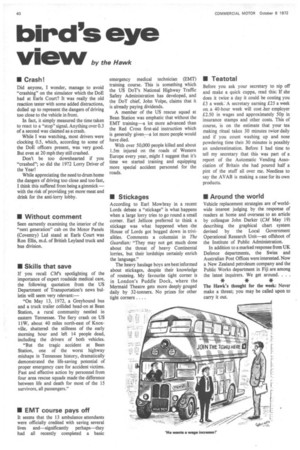bird's eye
Page 42

If you've noticed an error in this article please click here to report it so we can fix it.
view by the Hawk
• Crash!
Did anyone, I wonder, manage to avoid "crashing" on the simulator which the DoE had at Earls Court? It was really the old reaction tester with some added distractions, dolled up to represent the dangers of driving too close to the vehicle in front.
In fact, it simply measured the time taken to react to a "stop" signal. Anything over 0.3 of a second was claimed as a crash.
While I was watching, most drivers were clocking 0.5, which, according to some of the DoE officers present, was very good. But even at 20 mph they still crashed.
Don't be too downhearted if you "crashed"; so did the 1972 Lorry Driver of the Year!
While appreciating the need to drum home the dangers of driving too close and too fast, I think this suffered from being a gimmick — with the risk of providing yet more meat and drink for the anti-lorry lobby.
• Without comment
Seen earnestly examining the interior of the "next generation" cab on the Motor Panels (Coventry) Ltd stand at Earls Court was Ron Ellis, m.d. of British Leyland truck and bus division.
• Skills that save
If you recall CM's spotlighting of the importance of expert roadside medical care, the following quotation from the US Department of Transportation's news bulletin will seem very relevant:—
"On May 13, 1972, a Greyhound bus and a truck trailer collided head-on at Bean Station, a rural community nestled in eastern Tennessee. The fiery crash on US 11W, about 40 miles north-east of Knoxville, shattered the stillness of the early morning hour and left 14 people dead, including the drivers of both vehicles.
"But the tragic accident at Bean Station, one of the worst highway mishaps in Tennessee history, dramatically demonstrated the life-saving potential of proper emergency care for accident victims. Fast and effective action by personnel from four area rescue squads made the difference between life and death for most of the 15 survivors, all passengers."
• EMT course pays off
It seems that the 13 ambulance attendants were officially credited with saving several lives and—significantly perhaps—they had all recently completed a basic emergency medical technician (EMT) training course. This is something which the US DoT's National Highway Traffic Safety Administration has developed, and the DoT chief, John Volpe, claims that it is already paying dividends.
A member of the US rescue squad at Bean Station was emphatic that without the EMT training—a lot more advanced than the Red Cross first-aid instruction which is generally given—a lot more people would have died.
With over 50,000 people killed and about 1.5m injured on the roads of Western Europe every year, might I suggest that it's time we started training and equipping more special accident personnel for the roads.
• Stickages
According to Earl Mowbray in a recent Lords debate a "stickage" is what happens when a large lorry tries to go round a small corner. Earl Jellicoe preferred to think a stickage was what happened when .the House of Lords got bogged down in trivialities. Comments a columnist in The Guardian: "They may not get much done about the threat of heavy Continental lorries, but their lordships certainly enrich the language."
The heavy haulage boys are best informed about stickages, despite their knowledge of routeing. My favourite tight corner is in London's Puddle Dock, where the Mermaid Theatre gets more deeply gouged daily by 32-tonners. No prizes for other tight corners . . . .
• Teatotal
Before you ask your secretary to nip off and make a quick cuppa, read this: If she does it twice a day it could be costing you £3 a week. A secretary earning £25 a week on. a 40-hour week will cost .her employer £2.50 in wages and approximately 50p in insurance stamps and other costs. This of course, is on the estimate that your tea making ritual takes 30 minutes twice' daily and if you count washing up and nose powdering time then 30 minutes is possibly an underestimation. Before I had time to tell my secretary that this was part of a report of the Automatic Vending Association of Britain she had poured half a pint of the stuff all over me. Needless to say the AVAB is making a case for its own products.
• Around the world
Vehicle replacement strategies are of worldwide interest judging by the response of readers at home and overseas to an article by colleague John Darker (CM May 19) describing the graphical chart system devised by the Local Government Operational Research Unit—an offshoot of the Institute of Public Administration.
In addition to a marked response from UK Defence departments, the Swiss and Australian Post Offices were interested. Now a New Zealand petroleum company and the Public Works department in Fiji are among the latest inquirers. We get around. . . .
The Hawk's thought for the week: Never make a threat; you may be called upon to carry it out.






































































































